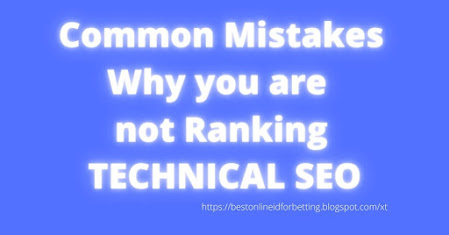TECHNICAL SEO: COMMON REASONS WHY YOU AREN’T RANKING
What is Technical SEO?
Technical SEO is the way you’ve configured certain parts of your website so that it can be indexed for the web. It covers all of the low down, in the background perspectives, for example, crawling, indexing, site structure, migrations, page speeds, core web vitals, and more
Assuming you're at all worried about how your site is positioning (and on the off chance that you're here, you presumably are) something essentially can't be ignored.
Technical SEO Techniques:
Web page speed
Structure of Website
Sitemap
Redirect Pages
Mobile Friendliness
For what reason is Technical SEO Important?
Suppose your substance is first class, however your Technical SEO no longer doesn't depend on norm. Your site won't wind up positioning. This is on the grounds that making extraordinary substance doesn't exactly make any difference on the off chance that no one can find or see it.
In spite of the fact that web search tools are getting better at slithering, ordering, and understanding plan, they're still distant from great. In this way, great site content should be supplemented by areas of strength for a SEO establishment.
Technical SEO can likewise affect your site's lead age, change rates, and deals.
This sort of SEO is significant on the grounds that, without it, your site will be inappropriately filed. On the off chance that this occurs, Google, Bing, Facebook, and other web crawlers won't know when to show your webpage on output pages.
Playing out a Technical SEO review on your site will guarantee that you have the legitimate structure set up so all of the difficult work you've done on your site will be filed and positioned!
Normal SEO Mistakes
Mistake 1: Duplicate Content
On the off chance that there's one thing Google adores, it's interesting substance.
That implies that copy content is a colossal issue on the off chance that you're attempting to rank on the main page of the query items.
Use instruments like Screaming Frog, Deep Crawl, or SEMRush to see whether you have a copy content issue. These apparatuses will creep your website, as well as different destinations on the web, to see whether your substance has been re-posted anyplace.
This could happen when another person re-posts your substance on an alternate URL or on the other hand on the off chance that you have a similar substance posted on a page and on a post.
To battle this issue, ensure each page is exceptional. Each page ought to have its own URL, title, depiction, and H1/H2 headings. Your H1 heading ought to be a noticeable title that contains your essential catchphrase. Make certain to place an immediate watchword in each part of your page to exploit the strength of your catchphrases.
You ought to try and be cautious when you reuse pictures and the alt-labels that go with those pictures. While these labels ought to contain watchwords, they can not be indistinguishable. Think of ways of consolidating the catchphrases while being different enough that your labels don't get listed as copy content.
Additionally, search for copy content in your organized information or mapping. This is much of the time a disregarded site perspective that can adversely influence your positioning. Google has an extraordinary Schema Markup device that will assist you with ensuring that copy content isn't showing up in your mapping.
Mistake 2: rel=canocial Issues
You can utilize rel=canocial to assist partner a page with another page. This assists with helping validity and cutoff copy content without harming your positioning.
It tells web search tools that the page with rel=canonical is the one that ought to be filed.
Be that as it may, assuming utilized in some unacceptable spot, it could create some turmoil and lead web crawlers to not rank your page by any means.
Go through the code on every one of your pages to find rel=canonical and ensure it's being used appropriately.
Mistake 3: Title Tag Issues
Title labels can have various issues that influence SEO, including:
Copy labels
Missing title labels
Too lengthy or too short title labels
And so forth.
Your title labels, or page title, assists the two clients and web search tools with figuring out what's going on with your page, making them an (naturally) significant piece of the enhancement cycle.
To get your title labels perfectly, you want to begin with the essentials.
In the first place, your title tag ought to be 50-60 characters in length and incorporate a couple of your objective watchwords. To stay away from specialized issues, ensure you have no copies on your site.
Beyond the specialized domain, a strong, click-commendable title will include:
We should discuss the most widely recognized Technical SEO slip-ups and how you might fix them.








0 Comments